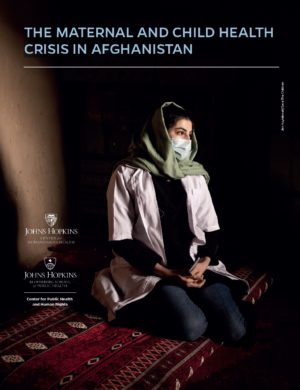
A new study by the Johns Hopkins Center for Humanitarian Health and Center for Public Health and Human Rights reveals that the Taliban takeover of Afghanistan in August 2021 and economic collapse in part triggered by Western actions ”“ particularly the American withdrawal from the fragile nation ”“ have created a health crisis for women and children. ”¯
As a result of a combination of Taliban restrictions on unaccompanied travel by women, lack of consistent pay and unavailability of critical medical supplies, 43.8% of workers reported their working conditions as “worse” or “much worse” since the Taliban takeover.”¯More than half reported they were not paid regularly since August 2021. Almost 47% reported a decrease in the availability of essential medicines to meet patient care needs. More than 80% of female workers reported being stopped by Taliban security forces, often to be harassed or even beaten because they were traveling unaccompanied by a male relative, while 80% of staff working in urban private and public clinics described a decrease in staff morale and motivation since August 2021.
In five urban health centers surveyed, 57.1% of the staff reported a decrease in work attendance, and 81% of workers in public health facilities reported that work attendance had decreased since August 2021 due to lack of pay and/or risk of harassment and violence when leaving their homes.
Other findings include:
More than 40% of workers reported that the availability of maternal and child health care has “decreased a little” to “decreased a lot” in their community.”¯
Almost 25% of workers reported that because of the worsening conditions in health facilities they were not able to provide care for mothers and children.
More than 36% of workers reported that infant/child mortality has “increased a little” to “increased a lot.””¯
More than 31.4% of workers perceive that maternal mortality has increased in their community”¯since August 2021.
In the five urban centers, 64.3% of staffers reported the death of a mother and/or child in the last month in the facility where they work.
International donors, including the United States, have created humanitarian exceptions to the severe new economic sanctions imposed on the Taliban and provided stopgap funding for many health services they had funded in the past. But the severe economic downturn in the past year, created in part by economic sanctions and the strangling of central bank functions, led to a massive increase in poverty and unemployment and”¯exacerbated the health crisis. The Taliban”™s prohibition of secondary education for girls as well as harassment of women has led many workers and other workers to leave Afghanistan and obstructed the pipeline for new trainees.
Study authors Rabia Jalazai, Nancy Glass and Leonard Rubenstein recommend these solutions:
- The U.S. and other donors should establish a plan to sustain the health-care system in Afghanistan ”“ covering primary, secondary and tertiary care ”“ in conjunction with health officials in Afghanistan, without channeling funds through the Taliban government.”¯”¯
- The plans should include collaboration with and financial support for health-care professional organizations in Afghanistan as they are essential to ensure access to high quality services and education and ethical standards of practice for the next generation of workers and nurses.
- The U.S. and its allies should expedite surveys to understand the health-care crisis.
- They should continue to put diplomatic pressure on the Taliban to cease breaches of women”™s rights, limitations it has imposed on freedom of movement, education, employment and access to health care.”¯
- While the recently established Afghan Fund enables some central bank functions, the U.S. should continue negotiations with the Taliban to establish central bank functions subject to monitoring.


















